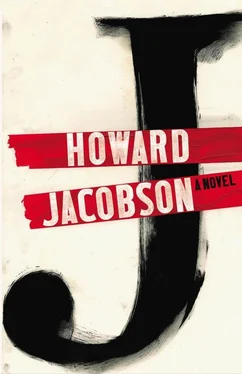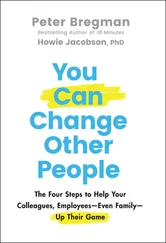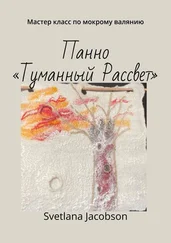Kevern shrugged a shrug of only half-surprise. ‘That makes it easier for everyone then, doesn’t it? Husband kills wife and lover and then kills himself. Case closed. Why are you speaking to me?’
‘If only it were as simple as that. It would appear that Mr Morgenstern didn’t die by his own hand.’
‘What!’
‘As you say yourself, Mr Cohen, there’s a lot of anger and frustration out there.’
‘You’re telling me Ade Morgenstern’s been murdered now?’
‘Well if he didn’t do it to himself — which given the manner of his death he couldn’t — and if it wasn’t natural causes — which it wasn’t — and if we rule out the hand of God — which I think we must — that’s the only supposition I can make.’
Kevern Cohen shook his head. He couldn’t quite muster horror or even profound shock, but he mustered what he could. ‘Christ, what’s going on in this village?’
Detective Inspector Gutkind showed Kevern a philosophic expression. As though to say, well isn’t that precisely what I hoped you might be able to answer.
He didn’t write this in his report, but what Detective Inspector Gutkind felt in his heart was this: ‘Something smells. Maybe not this, but something.’
ii
Kevern thought he’d better prepare Ailinn for what she might hear. He had, some months before they’d met, he mustered the honour to tell her, kissed the murdered woman. He knew not to say it was nothing. He couldn’t have it both ways: if he boasted he was no citizen of Snogland, then he couldn’t claim a kiss was nothing. Besides, women didn’t like to hear men say that things they did with their bodies and which ought to involve their emotions were nothing. If it was nothing then why do it; and if it was something then don’t lie about it. But it wasn’t a long kiss and if he hadn’t thought about it much the day after — he wasn’t going to claim he hadn’t thought about it at all — he certainly hadn’t thought about it since he’d been with Ailinn who drove all trace of memory of other kisses from his mind.
She was disappointed in him. Not angry. Just disappointed. Which was worse.
‘I’m sorry,’ he said, ‘if I’ve made you jealous.’
‘ Jealous ?’
‘I don’t mean jealous.’
‘What do you mean?’
What did he mean? ‘You know,’ he said.
‘Was there something between you I should be jealous of?’
‘No, no.’ Here it came — in that case why did he bother to kiss her. .
‘What I feel,’ she said, letting him off, ‘is that it would have been nice to go on thinking of you as a man who doesn’t throw kisses around. Who respects himself or at least his mouth more.’
Kevern tried to think of any man he knew who respected his mouth.
‘Well it was no disrespect to you,’ he said. ‘I hadn’t met you. Unless you believe one can demean a person in retrospect.’
She thought about it for longer than he would have liked. ‘No, no it doesn’t demean me in retrospect,’ she said at last. ‘It demeans you, which reflects on me, and it takes a little from my fantasy. . but that was always just girlish nonsense anyway. So no, yes, I’m all right about it, and I thank you for being honest with me.’
Kevern felt he’d been kicked in the stomach. She was no/yes/noing him. Yes, no, she was all right about it , which was the language of compromise and disillusionment. And he had shattered her fantasy, which meant her hope to live a life above the common. He had brought her low with his honesty — honesty being the kindest yes/no word she could find for his being a man like every other.
A man like Ahab, even. Demoniacally hell-bent on her unhappiness by simple virtue of his being a man. Except that he wasn’t. Yes/no.
He asked her to make love to him, on his bed with the sheets thrown back and the windows open, not to remove all trace of Lowenna Morgenstern’s kisses from his lips, but to remove all trace of this conversation. She shook her head. It didn’t quite work like that for her. In the open air then. On the cliffs. In Paradise Valley. Let Nature do the job. But she wasn’t quite in the mood for that either. She would walk with him, though. A long bracing walk where they could talk about something else. Look beyond them. Not talk about themselves at all. ‘We are a bit in each other’s heads,’ she said.
He knew what she meant but the last thing he wanted to do was walk her out of his.
They walked well together, he thought. Which was a sign of their compatibility. They were always in step. When one put out a hand the other found it immediately. They stopped to look at the same flowers or to admire the same picturesque cottage. They stooped in unison to stroke a cat or pick up litter. Neither started to speak before the other had quite finished, or at the very moment that the other began a sentence. They talked side by side, like instruments in an orchestra. This wasn’t only good manners; it was an instinctive compatibility. Their hearts beat to an identical rhythm.
Had his incestuous parents felt like this at the beginning, he wondered.
He laughed, suddenly, for no reason. Threw back his head and laughed at the sky. She didn’t ask him why, she simply threw back her head and did the same. A minute later she seized him by the arm and made him look at her. ‘This is very dangerous,’ she said.
‘You think I don’t know that?’ was his reply.
He proposed a trip away, a few days’ holiday from this degrading village. Gutkind had not asked him to stay put, so he believed he was no more a suspect than all the other men in the county Lowenna Morgenstern had kissed. He was more worried about what the policeman might write in his report about the furniture.
They would pack a couple of bags, drive north, find a city where people didn’t know them and weren’t murdering one another, stay in a nice hotel that had no view of the sea, go to a couple of restaurants, maybe take in a film, reconnect with each other after the Morgenstern business, no matter that they hadn’t come apart over it. Ailinn was surprised to discover he owned a car, which he kept under tarpaulin in the public car park. He had never struck her as a car person. Once she saw him drive she realised she was right. ‘You drive so slowly,’ she said, ‘how do you ever get anywhere?’
‘Where is there to get?’
‘Wherever it is we’re going.’
He hadn’t told her. He wanted it to be a surprise. To both of them.
‘Let’s just drive,’ he said, ‘and stop when we’re tired.’
‘I’m tired.’
‘Already?’
‘I’m tired in anticipation.’
Was this, he wondered, a play on his having been unfaithful to her in retrospect?
He stopped the car and looked at her.
She had a suggestion. ‘Let me drive. At least that way we’ll arrive somewhere.’
He was worried that she hadn’t driven in a while, that she didn’t know the roads down here, that she wasn’t familiar with the vehicle, that she hadn’t studied the manual.
‘A car’s a car, Kevern!’
Fine by Kevern. He pulled on the hand brake, turned off the engine, and changed seats with her. Not being a car person was one of the ways he had always defined his anomalous masculinity. The men of Port Reuben wanted to kill in their cars; they accelerated when they saw a pedestrian, they revved the engines for the pure aggression of it even when their cars were parked in their garages. Then on Sundays they soaped them as though they were their whores. If they reserved such attention for their cars it was no surprise, Kevern thought, that their wives, the moment they had a drink inside them, were eager to kiss him, a man careless of cars.
Ailinn drove so fast he had to close his eyes.
Читать дальше












